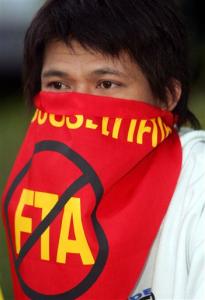- Negotiations

The US and Thailand started negotiations on a comprehensive bilateral free trade agreement in June 2004.
Like other recent bilateral free trade agreements with the US, the US-Thailand FTA will cover investment, services, government procurement, intellectual property, as well as agriculture. Many expect it to be modeled on the US-Singapore FTA.
The negotiations have attracted strong opposition and concern among many Thai social movements, farmers to people with HIV/AIDS. A broad civil society coalition, FTA Watch, was formed at the outset to closely monitor the process from a public interest perspective. (Likewise, business interests set up their own US-Thai FTA Coalition.) Under the banner of "sovereignty not for sale!", key issues of popular concern include access to medicine, GMOs in agriculture and patents on life.
The last round of talks took place in Chiang Mai in January 2006 with 10,000 people protesting in the streets and disrupting the meeting. Negotiations have not resumed since.
last update: May 2012
13-Oct-2005
Bangkok Post
Thai negotiators could ultimately be forced to accept a "negative list" approach in negotiating the Thailand-US free trade area agreement, according to Pongpanu Svetarunvra, deputy director-general of the Fiscal Policy Office. Under a negative list approach, all sectors and services will be liberalised except for those explicitly stated in the agreement.
4-Oct-2005
AFP
The United States and Thailand have made "significant progress" in their latest round of talks to forge a free trade agreement, the US Trade Representative’s office said on Monday.
3-Oct-2005
Bangkok Post
Thailand and the United States have sorted out some technical issues but not major points during the week-long fifth round of the Thailand-US free trade talks that ended yesterday in Hawaii.
2-Oct-2005
MCOT
Negotiations between Thailand and the United States on a planned bilateral free trade area (FTA) are on well progress in its fifth round, with Washington agreeing in principle to protect Thai intellectual property on the Internet and to use the Thai laws to take care of the environment.
30-Sep-2005
American Chamber of Commerce in Thailand
Ambassador Nitya Pibulsonggram, the chief negotiator for the Thailand-US Free Trade Agreement, spoke to AMCHAM members on May 25, 2005 about the importance of the FTA to Thailand.
22-Sep-2005
Bangkok Post
US congressmen have pledged to accommodate Thailand’s concerns about drug prices and freer mobility for Thais into the United States once the two countries conclude their free trade area (FTA) agreement.
22-Sep-2005
The Nation
Finance Minister Thanong Bidaya said yesterday that the Thai-US free-trade agreement (FTA) would be difficult to hurry as Thai bankers are concerned about competing with their sophisticated counterparts in the field of e-banking. “I can’t say when the deal could be concluded because both sides still use absolutely different approaches,” Thanong said.
21-Sep-2005
Asia Pulse
Thai Prime Minister Thaksin Shinawatra and US President George W Bush agreed Monday to make vigorous efforts to reach a conclusion on the US-Thai Free Trade Agreement (FTA) next year, the leaders said in a joint statement.
20-Sep-2005
Bangkok Post
As senior bureaucrats from Thailand and the US prepare to enter the fifth round of negotiations over the Free Trade Agreement (FTA) in Hawaii later this month, two Thai organic farmers have started their own campaign in the US. Phakpum Inpaen and Kanya Onsri from Surin province left Thailand yesterday on a 23-day circuit tour to talk to people in the US about how the FTA deal will threaten their survival.
14-Sep-2005
Bangkok Post
The free trade agreement with the United States threatens Thailand’s ecological biodiversity and cultural uniqueness, researchers warned yesterday. Visut Baimai, director of the Biodiversity Research and Training Programme, said he feared the FTA would accelerate deforestation to grow profitable single-crop plantations. This, he said, could undermine both the ecosystem and sustainable economic development.
Links
-
A US campaign website on the Thai-US FTA
-
A coalition of activists, lawyers, NGOs, social movements and labour groups monitoring the US-Thailand FTA negotiations.





